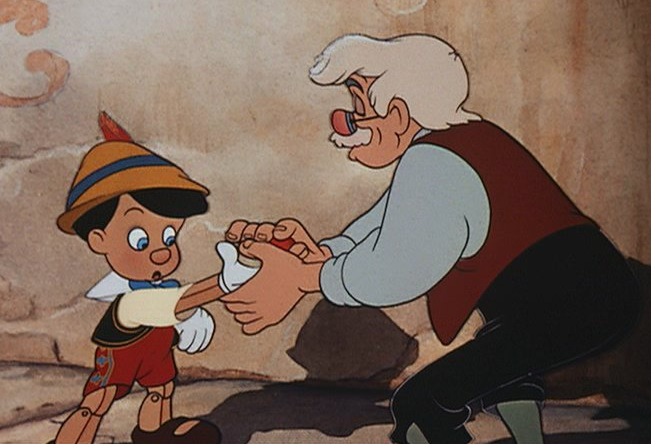Geppetto did not have a penny in his pocket, so he made his son a little suit of flowered paper, a pair of shoes from the bark of a tree, and a tiny cap from a bit of dough.
杰佩托口袋里连一个子儿也没有,于是用花纸给他的孩子做了一套衣服,用树皮给他做了一双鞋,用生面团给他做了一顶小帽子。
Pinocchio ran to look at himself in a bowl of water, and he felt so happy that he said proudly:
皮诺乔马上跑到一脸盆水那里去照,对自己的模样满意极了,神气活现地说:
"Now I look like a gentleman."
“我真像一位体面的先生!”
"Truly," answered Geppetto. "But remember that fine clothes do not make the man unless they be neat and clean."
“不错,”杰佩托回答说,“可是你要记住,使人成为体面先生的不是好衣服,而主要是整洁的衣服。”
"Very true," answered Pinocchio, "but, in order to go to school, I still need something very important."
“确实如此”,木偶又说了,“我上学还少一样东西,一样最要紧的东西。”

"What is it?"
“什么东西?”
"An A-B-C book."
“一本识字课本。”
"To be sure! But how shall we get it?"
“你说得对,可怎么弄到它呢。”
"That's easy. We'll go to a bookstore and buy it."
“那还不方便,到书店里买就是了。”
"And the money?"
“钱呢?……”
"I have none."
“我没有。”
"Neither have I," said the old man sadly.
“我也没钱,”老头说,心里很难过。
Pinocchio, although a happy boy always, became sad and downcast at these words.
皮诺乔尽管是个快活透顶的孩子,听到这局呼也开始垂头丧气。
When poverty shows itself, even mischievous boys understand what it means.
因为即便是淘气的孩子也懂得贫穷意味着什么。
"What does it matter, after all?" cried Geppetto all at once, as he jumped up from his chair.
“没法子,只好这么办!”杰佩托叫了一声,从他的椅子上忽然猛地站起来。
Putting on his old coat, full of darns and patches, he ran out of the house without another word.
穿上他那打满补丁的粗布旧上衣,一言不发地跑出门去了。
After a while he returned. In his hands he had the A-B-C book for his son, but the old coat was gone.
一会儿工夫他就回来。他手里拿着给他孩子买的识字课本,可短上衣没有了。
The poor fellow was in his shirt sleeves and the day was cold.
这个可怜人只穿着衬衫,而天气异常寒冷。
"Where's your coat, Father?"
“上衣呢,爸爸?”
"I have sold it."
“我给卖了。”
"Why did you sell your coat?"
“为什么卖了?”
"It was too warm."
“因为我热。”
Pinocchio understood the answer in a twinkling, and, unable to restrain his tears, he jumped on his father's neck and kissed him over and over.
他回答的这句话是什么意思,皮诺乔一下子就明白了,眼泪止不住就流了下来,就扑上去抱住杰佩托的脖子,不停地亲吻他。












